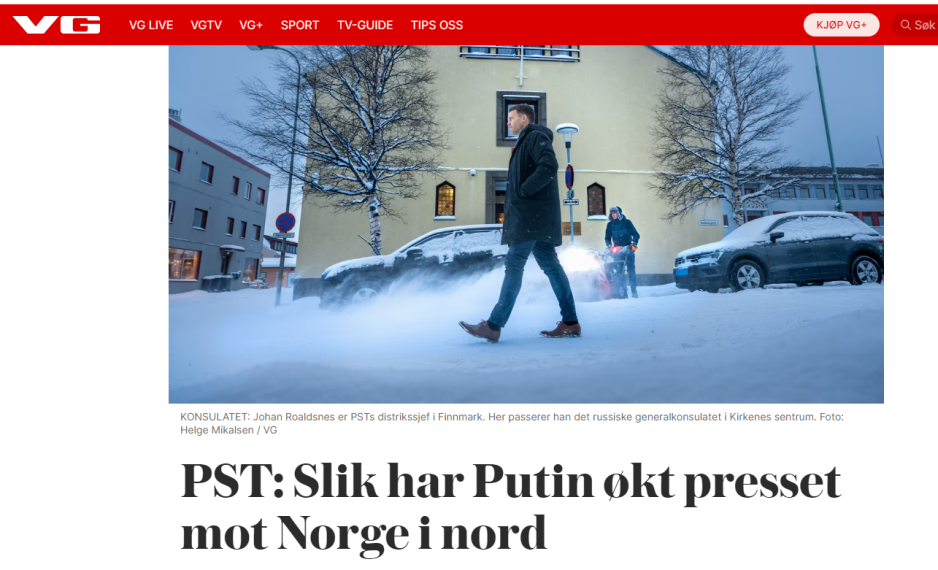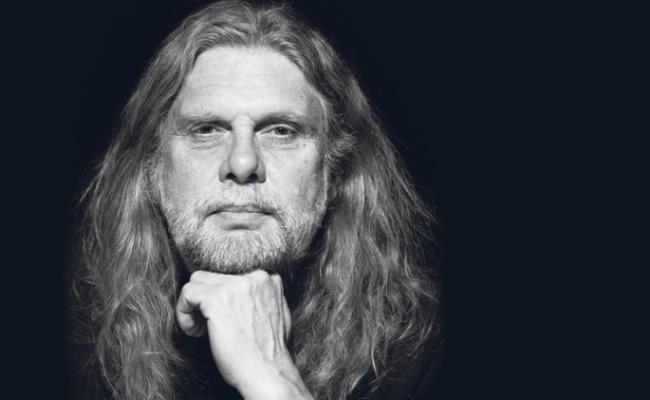Arne O. Holm says: Is the Norwegian Security Service Trying to Scare People Southward?

Screenshot from VG.
Commentary: The Norwegian Police Security Service (PST) has gone from invisible to very visible. Most recently in Kirkenes, where it has "come forward" in a Norwegian national newspaper. That is a good thing. But to step out of the dark and into the light sets new requirements for "the secret services."
The history of Northern Norway, and Finnmark in particular, is a history of intense surveillance of Norwegians suspected of espionage to benefit the Soviet Union. There have also been written history tomes about people who unjustly had suspicion cast upon them, about division in the population, about democratic political activity that turned into treason in the intelligence's archives.
In the same way, there are stories about actual spies on behalf of our neighbor in the East.
It has affected politics, business, and, not least, everyday life in the northeast of Norway.
And it still does.
Following PST in real-time
We know a lot about this in retrospect, as archives were opened and historians could embark on their analyses.
All of this is certainly correct.
Today, things are different. We are now following the PST's operations in real time. When the PST in Finnmark "comes forward" in VG, it follows after a number of "coming forwards" in other places, such as NRK's Skyggekrigen, a TV show in which PST legitimizes the channel's many undocumented claims of espionage through Russian trawler fleet.
That is a topic I have previously written about.
PST plays an important role in preventing and investigating punishable acts against Norway's security. The gravity of our international situation emphasizes and strengthens the need for an efficient and well-functioning service.
However, as PST claims a correct and important place in the public conversation, its mandate expands. The security service becomes a political actor whether it wants to or not. It sets the premises for discussions nationally and locally.
This applies in particular to the situation in Eastern Finnmark, which is the topic of VG's interview with the district's PST leader. If Johan Roaldsnes is quoted correctly, the main message is that Putin has "increased pressure against Norway in the North."
Also read (The Article Continues)
Pressure from Moscow
There is no reason to question that.
The same applies to the district leader's other messages, which are that Moscow is pressuring Russians in Kirkenes, that Ukrainian refugees heading from Russia to Sør-Varanger are being interrogated on the Russian side of the border, that not all Russian fishers who set ashore look like fishers, however they should look, or that 400 Russians reside in Kirkenes, and that this is one of the reasons that the Norwegian security service has increased its presence after the war against Ukraine.
All of this is certainly correct. Russia is at war with the West and uses all means of war in its aggression.
But then the PST moves away from its findings and into analyses of the Norwegian population that has chosen to live near the Russian border.
"A narrative was constructed in which the 'intelligence' was operating in a way that was harmful to society," says Roaldsnes.
Like a plagiarized master's thesis.
According to the PST, the 'narrative,' which is a finer word for 'story,' arose after the former border inspector Frode Berg was arrested for espionage in December 2017 in Moscow.
As usual, the PST does not have to argue for or document their 'findings.' The organization's authority is so strong that it is not necessary. If the PST says the local population in Kirkenes established a story of PST conducting operations that were harmful to society, that must surely be the case?
Fabricated in Kirkenes
But was such an image really drawn of the PST?
Or was it instead a quite important and necessary debate about the PST's role in a small Norwegian community, in which one of its inhabitants had just been released from a Russian prison after having his travel expenses covered by Norwegian intelligence for years?
And was this a story fabricated in Kirkenes?
Also read (the article continues)
Let me step back in time.
After Frode Berg was released from prison and returned to Norway, the Norwegian Parliamentary Oversight Committee on Intelligence and Security Services (EOS) got involved. In short, the EOS Committee controls that the secret services are doing what they are supposed to within a legal framework. Therefore, they were naturally served the Berg case.
In February 2021, the conclusion was ready. The EOS Committee leader wanted the most of the committee's work or the conclusion, at the very least, to be made public. That would not be the case. Our politicians said no. First, Erna Solberg's political majority, amid protests from the Labor Party and the Center Party.
In time, when the Labor Party and the Center Party had a political majority, they also declined publication.
Thus, it was of little help that the EOS Committee wanted it made public. The report was kept secret.
I only see a man in a fur hat.
What happened after that is what often occurs with public secrecy. Slowly, the information seeps into open spaces, like a plagiarized master's thesis on the hunt for a larger audience.
Refused publication
NRK was just one of several who made parts of the report public.
"The report concludes that the critique must be characterized as serious and that the intelligence service has acted very harmful to society. For the EOS Committee, this is criticism of the strongest degree," wrote NRK.
In other words, Kirkenes had no community "drawing up a narrative about the intelligence service operating in a harmful way to society."
It was a conclusion. Made by the parliament's own control committee.
Also read (the article continues)
"Trust had to be rebuilt. We had to explain that our work was authorized by law," says the PST in the VG interview.
According to the EOS Committee, the problem was that such an authorization was missing. The instruction does not allow for "operations harmful to society." So yes, the PST had work to do to rebuild a breakdown of trust that they were responsible for themselves.
National media outlets make their way to the north at irregular intervals. Often, they cooperate with public institutions as these benefit from participating in the public debate.
They should continue doing so, but they should also correct political estimations. The government says it continuously works to draw people northward and keep the population currently residing in the north. By introducing free childcare, for example.
Cold underneath the fur hat
But who would pack up their kids and move to a society described in such a way by the PST? Except PST employees, perhaps?
They should also correct political estimations
VG finishes the interview and gets ready to photograph the PST district leader. Together, they find the perfect scenery outside the Russian consulate in the center of Kirkenes. We are informed that a Russian is clearing the sidewalk of snow with his 'face well-hidden under a large hood.'
What I see in the picture is a man in a fur hat. Perhaps not that strange when working outside in temperatures nearing -20 degrees.
"Are we being watched now, Roaldsnes?" asks the journalist in closing.
"We must assume we are," answers the PST.
I would also assume so. Just like I not only assume but also hope that the PST would be watching if a Russian journalist was photographing an FSS (the Russian Federal Security Service) agent outside the police station in Kirkenes.




